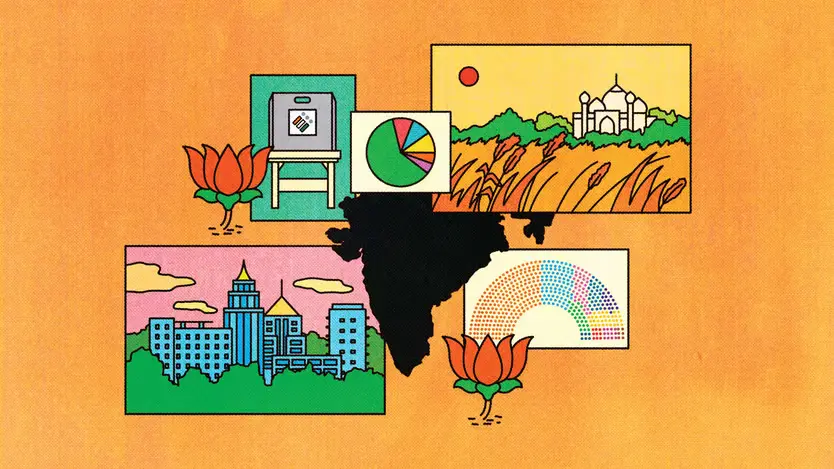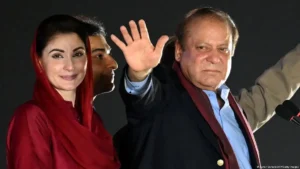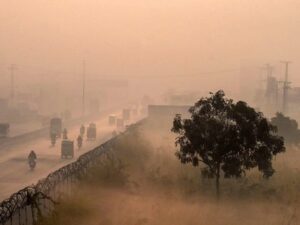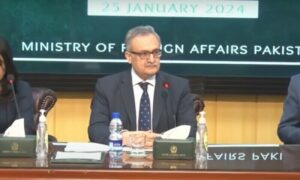As India grapples with the aftermath of recent state elections, a stark North-South divide has emerged, underscoring the nuanced fault lines within the nation’s social fabric. While Prime Minister Narendra Modi’s Bharatiya Janata Party (BJP) celebrated victories in the Hindi heartland, questions arise about Modi’s role as a unifying force based on Hindutva ideology and whether his policies have inadvertently exacerbated the internal divisions that define Indian society.
The electoral map tells a tale of two Indias – the triumphant BJP in the northern states of Chhattisgarh, Rajasthan, and Madhya Pradesh, and the Congress party’s success in the prosperous southern state of Telangana.
The stark contrast in political preferences between the north and the south raises questions about the efficacy of Modi’s leadership in India since May 2014.
Modi’s decade-long tenure has seen the BJP consolidating power in the northern and central regions, often relying on a Hindu-centric ideology that resonates strongly in these areas. However, the same ideology encounters resistance in the south, where voters have demonstrated a preference for a more inclusive and diverse political narrative.
However, it is notable that despite public support that positions Modi as a likely contender for a third term in the upcoming national elections, it is essential to scrutinize the internal and external dynamics of India’s policies under his leadership. While the BJP’s electoral triumphs showcase a formidable political machinery, it is crucial to question whether the party’s approach is fostering genuine unity or merely consolidating power within specific geographic and demographic pockets.
Internally, India faces multifaceted challenges, including rising unemployment, attacks against minorities, and a shrinking space for dissent. Modi’s ambitious policy agenda, marked by the abrogation of Article 370 in Kashmir and the construction of the Ram temple in Ayodhya, has stirred controversy and heightened communal tensions. The push for a uniform civil code further underscores the potential for policies that may deepen societal fault lines rather than bridge them.
Externally, India’s global standing is under scrutiny, with accusations of state-sponsored extra-judicial killings of Sikh separatists casting a shadow on diplomatic relations. The looming FATF scrutiny in 2024 adds another layer of complexity, requiring India to navigate international expectations on financial regulations and counter-terrorism efforts.
While public support for Modi remains steadfast, the question remains: does this popularity translate into a unifying force, or does it merely consolidate power along pre-existing fault lines? The BJP’s success in the north suggests a resonance with its Hindu-centric narrative, but the party’s struggle to make significant inroads in the south raises concerns about its ability to unite a diverse nation.
As India hurtles towards a pivotal moment in its political trajectory, the need for introspection becomes paramount. Can Modi’s leadership transcend regional and ideological boundaries, or does it risk entrenching divisions that could have far-reaching consequences for India and the region?
The significance of regional implications cannot be understated, with neighboring countries closely observing India’s internal shifts and their potential spill-over effects. Evidently, over the period of Modi-led government in India, cultural, fiscal, and political tensions intensified across regions, notably with the south’s longstanding resentment towards what it perceives as the imposition of values and language from the north. Amit Shah’s 2019 statement advocating Hindi as a unifying language sparked protests, revealing deep-rooted cultural fissures.
In the south, where the Congress party has managed to secure victories in Telangana and Karnataka, the persistence of the north-south divide becomes more apparent. The BJP’s limited electoral presence in the relatively more prosperous southern states emphasizes the challenges posed by regional differences.
In the coming years, as India heads towards national elections, the interconnectedness of domestic politics and foreign policy will be scrutinized more than ever.
The choices made by the electorate and the political leadership will not only shape the nation’s internal cohesion but also have far-reaching consequences for India’s standing in the international community. The delicate equilibrium between promoting a Hindu-centric agenda domestically and maintaining diplomatic relations regionally and internationally will be a defining factor in determining India’s role in an increasingly interconnected multipolar world. As the nation grapples with these challenges, the path chosen will not only influence the trajectory of India but will also echo across borders, with implications even broader for the landscape of South Asian geopolitics.
Your go-to editorial hub for insightful perspectives and informed analysis on pressing policy issues, both regionally and globally




